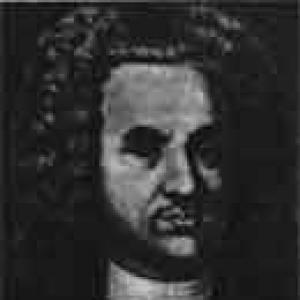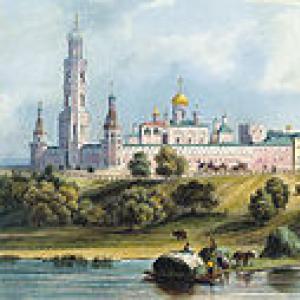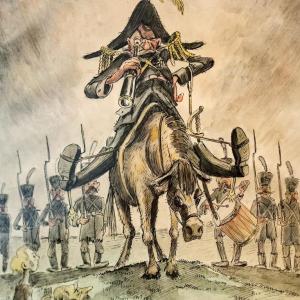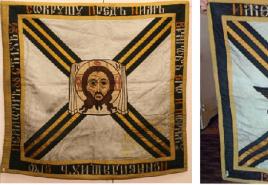The image and characteristics of Khlestakov in Gogol's comedy The Inspector General essay. The image and characteristics of Khlestakov in Gogol’s comedy “The Inspector General”: a description of appearance and character A brief description of Khlestakov from The Inspector General
The image of the false inspector in Gogol’s comedy is not at all the main one, but it is a key character, through interaction with which the characters of all the heroes, officials of a small county town, are written. Khlestakov was the touchstone that showed all the comedy of both bureaucratic lawlessness and the entire life of Russia at that time. It is precisely the stupidity of this petty official, who happened to be passing through here, that reveals the entire stupidity and worthlessness of the local aristocracy and the bureaucratic elite.
Initially, a stupid, eccentric young man is shown with excessive claims to life, which, as we understand, is his style of behavior. Then we see in his example the reality of this nature in other characters in the play.
Characteristics of Khlestakov

The initial characterization of Khlestakov was given by the author himself, as a recommendation for the actor who will embody this image on stage. He is characterized as an empty and extremely stupid person. However, as the play progresses, the image of Khlestakov is revealed more fully, in all its comic diversity.
It is no coincidence that the first appearance on stage of this image is associated not with the young man himself, but with his servant, who talks for a long time about the owner. Characterizes him - “it would be good, otherwise he’s a simple little elist,” implying obviously the most insignificant rank and the fact that the owner behaves stupidly and arrogantly, not according to his status. The local hotel owner characterizes them at all - “you and your master are swindlers, and your master is a rogue.” It is difficult to give a more precise description. In an argument with the owner, not just stupidity is revealed, but an awkward childish naivety in attempts to still make the proper impression and deceive everyone.

(Artist L. Konstantinovsky, illustration for "The Inspector General", 1951)
It is these attempts that he succeeds in communicating with local officials. For local officials, the fear of exposure of their unseemly actions in the service and innate respect for rank cover up the seemingly obvious stupidity of the visitor. And Khlestakov, as they say, has already suffered.
In communicating with the mayor and the local elite, our hero shows remarkable imagination and reckless arrogance, which could quickly be exposed in ordinary society, but in this case passes for the truth. The ladies, the police, and the owner of the city himself, whom the author described as “not a very stupid man,” turn out to be no less stupid.
The image of Khlestakov as the main character of the comedy

And yet, Khlestakov, through his role in the play, interacting with the other characters, is the main character. The way the other characters characterize him, in a positive laudatory or negative ironic manner, reveals their own characters.
By chance, finding himself in the role of the capital's auditor, Khlestakov, without any embarrassment, takes on this role and fulfills it in accordance with his own primitive ideas about the habits and lifestyle of high authorities. However, the fact that he cannot be exposed suggests that all bureaucrats were endowed with precisely such habits.

(Weinstein Mark Grigorievich "Khlestakov and Gorodnichy", 1945-1952)
They easily believe him and obsequiously try to please him, especially since they see him as a “high-flying” bird. The intelligent mayor, seasoned police officers, and young ladies easily recognize him as the capital’s playmaker. Obviously, this is, according to Gogol’s plan, a hyperbole of the elite that he observed in real life. And the final silent scene turns out to be the apogee of comedy and is perceived by the characters themselves as only a possible repetition of everything that happened.
Even the very fact of exposure did not in any way affect the change in the consciousness of their own mistake and stupidity, either of the local bigwigs or the false auditor himself. The only disappointment on both sides is the unfortunate mistake and the fact that this official did not turn out to be exactly who he said he was. Just the annoyance that “the story will spread all over the world.” And the very fact of the mistake did not turn out to be a lesson for anyone, because the mistake itself was only in the personality of the arriving fool, but not in his behavior, actions, stories and boasting. As the mayor put it, “I’m not glad that I gave him water, as if half of what he said turns out to be true!” This is precisely the main meaning put into the image of the main character by the author. The stupidity of officials reveals the very depravity of the entire bureaucratic system of the state.
In his work, Gogol tried to focus public attention on the attitude of officials to their duties in the workplace. The image and characterization of Khlestakov in the comedy “The Inspector General” will make it possible to create a composite portrait of all officials in the person of the main character. Khlestakov managed to collect in himself all the universal vices, giving the name to the whole phenomenon - “Khlestakovism”, which hides stupidity, lies, frivolity and irresponsibility for one’s actions.
Image of Khlestakov
Gogol, at the very beginning of the work, described Khlestakov as follows:
“...a young man of about twenty-three, thin, thin; somewhat stupid and, as they say, without a king in his head, - one of those people who in the offices are called empty ... "
Full name Ivan Aleksandrovich Khlestakov. Arrived from St. Petersburg. Originally from the Saratov province, where his parents live. Official. A short brown-haired man with shifty eyes. He had a pleasant appearance and made a special impression on women.
“...Oh, how nice!”
Khlestakov liked to dress according to fashion. It was his love for expensive clothes that played a cruel joke on him. Local officials mistook him for an auditor. The protagonist's speech is abrupt. The phrases fly out before he has time to think.
“His speech is abrupt, and words fly out of his mouth completely unexpectedly...”
Characteristic
Khlestakov found himself at the scene of the events described by chance. Having lost to smithereens at cards, he was forced to stay at a local hotel.
“...If I hadn’t had a party in Penza, I would have had enough money to get home...”
The road to his native village was postponed for some time due to the complete depletion of his pocket.
A small man, well aware of his position in society. The salary in the office is meager, but I want to live beautifully. Khlestakov, while working in St. Petersburg, saw enough of people who did not deny themselves pleasures, who were accustomed to living to the fullest. He wanted it too, but with his capabilities he could only dream about it.
The father regularly sent money to his unlucky son. With enviable regularity, Khlestakov lost cash at cards. The bad habit had become firmly entrenched in him.
Jonah. Even the servant treats him with slight disdain. Khlestakov’s talent lies in the ability to lie and show off. He deftly took advantage of the situation when he was mistaken for an auditor and began to be given money. The other one in his place burned with shame, but he did not. Audacity second happiness. It's about him.
Lover of women. He managed to set his sights on two people at once, the mayor’s wife and daughter.
“...The mayor’s daughter is very pretty, and her mother is such that it would still be possible...”
The women did not suspect a trick in the sweet speeches, immediately believing the rascal.
In addition to lies, Khlestakov loved to fantasize. Moreover, he believed in his fantasies, often imagining himself in the role of a general, a famous writer, or a public figure. Human "without a king in my head". Frivolous. Superficial When committing actions, he does not think at all about the consequences.
How could he borrow money, knowing that he couldn’t pay it back? In his opinion, success does not require much effort. A fool is the one who earns his living with hump and blood. Khlestakov believed that everything in life depends on chance. If you get a lucky ticket, as is the case with the role of auditor, why not take advantage of it.
He managed to fool all the city officials. As if under hypnosis, they succumbed to his charm and ability to speak beautifully. No one was even surprised how at his age one could achieve such heights.
This man's ego is off the charts. Considering himself an order of magnitude superior to others in intelligence, he looks at people as fools, over whom one can and should boast and mock.
His adventure could have resulted in imprisonment if he had not left the city in time. Soon after his departure, the mayor and other officials learned the truth from a letter left by Khlestakov for a journalist friend. One thought was spinning in the mayor’s head: how could he
“Take an icicle or a rag for an important person! Now he’s singing bells all over the road!”
These words contain the whole essence of Khlestakov. A dummy and a tyrant who knows how to pretend in time to be who he needs to be and take advantage of the situation for his own benefit.
Khlestakov is an “elistrate” from St. Petersburg, a typical representative of an official who hangs around in departments and living rooms, bookstores and coffee shops. He saw something, heard something. The main things in Khlestakov’s life were money, rank, career and social life. But he failed to accomplish all this, and he goes to the village. Khlestakov has an “extraordinary lightness of thought” in his head; he is ready for any adventure: to show off, play cards, have fun. And then a convenient opportunity presents itself - he is mistaken for an auditor. In the scene of lying he reaches the top, although he lies constantly. And this is where the peculiarity of Gogol’s comedy manifests itself: they don’t believe the truth, but they listen to lies with their mouths open. At first it seems to us that Khlestakov is naive, but this is not so. He innocently accepts the circumstances in which he finds himself. It seems to us that Osip is telling the owner to “get lost,” but Khlestakov also suspects something wrong in the current situation: “It seems to me, however, that they take me for a statesman... What a fool!” Showing off in front of Marya Antonovna, he almost let it slip: “For mercy, madam, I am very pleased that you took me for the kind of person who...”, but he caught himself in time so as not to bring trouble upon himself. Khlestakov realized that he had been mistaken for someone else, and willingly entered into the role. He did not deceive the officials; they deceived themselves.
Khlestakov’s character is typical of many people. N.V. Gogol himself wrote: “Everyone, even for a minute... is or was made by Khlestakov... And a clever guards officer will sometimes turn out to be Khlestakov, and a statesman..., and our brother, a sinful writer. In short, it’s rare that someone won’t be one at least once in their life.” Each character in the comedy has his own Khlestakovism: the dreamy Mayor, Shpekin, in the character of Osip.
We meet Khlestakov right away, in “Notes for Gentlemen Actors”: “Khlestakov, a young man of about 23, thin, thin, somewhat stupid and, as they say, without a king in his head... He speaks and acts without any consideration... His speech is abrupt , and the words fly out of his mouth completely unexpectedly... Dressed in fashion.”
Scene after scene reveals to us the vivid image of Khlestakov. He came to St. Petersburg from the Saratov province to succeed in his service. Having been in the noble halls and a little trimmed, dressed in the capital's fashionable clothes, Khlestakov is forced to return home to his father, having squandered his parents' money and achieved nothing in the service.
Khlestakov, according to Osip, is “a simple little strategist.” “The second month has passed, as if already from St. Petersburg! He squandered a lot of money, my dear, and now he’s sitting there with his tail twisted.” He is a careless son of a parent, he says about his father that he is “stubborn and stupid, an old horseradish, a log.” Khlestakov doesn’t like living in the village; he prefers metropolitan life. “My soul yearns for enlightenment,” “after all, you live to pluck flowers of pleasure.”
In different cities, on the way home, he tries to show himself as a socialite, goes on a spree, loses his last money at cards, because... for him it is “tempting to play.” And he remains in the city without funds, he faces prison.
Sitting for a long time in a hotel, fear of the arrival of the auditor, forces officials, led by the mayor, to see a government official in the passing “elistrate”.
Realizing that he is being mistaken for an important bird, Khlestakov “allows dust.” When he tells the truth, officials consider it a lie, and when Khlestakov lies, they take his words as the truth.
Khlestakov lies so much that he himself believes in the heat of what was said and cannot stop. But he is not as stupid as he seems at first. He understands that he has been mistaken for a government official, and tries to extract the greatest benefit from this for himself: he extorts money, takes bribes, and drags after the mayor’s daughter and wife.
When he realizes that it is time to end this game, which Osip asks him to do, he sends a letter to his friend Tryapichkin in St. Petersburg, where he very accurately characterizes all the officials of the city. He is ungrateful, forgets about money, receptions, dinners and benefactors, writes that “the mayor is stupid as a gray gelding”, “Strawberry is a perfect pig in a yarmulke”, etc.
The comedy “The Inspector General,” written in the first half of the 19th century, has not lost its significance to this day. There still live among us mayors, postmasters and other heroes whose features resemble the heroes of a comedy. There are Khlestakovs among us. No wonder they say: he lies like Khlestakov. Khlestakov is the image of an empty, worthless person, incapable of anything good for society. He likes to be shown “loyalty and respect” without giving anything in return.
>Characteristics of the heroes The Inspector General
Characteristics of the hero Khlestakov
Khlestakov Ivan Aleksandrovich is the central character of N.V. Gogol’s comedy “The Inspector General,” a petty official from St. Petersburg, an imaginary inspector, one of the most famous characters in Russian literature. This is a young man of about 23 years old, thin, a little stupid and unable to pay attention to any thought for a long time. In St. Petersburg, he is an official of the lowest rank, about whom no one knows anything. Nobody respects him, not even his servant Osip. Khlestakov has a faceless personality, is insignificant and poor.
On the way to the Saratov province to visit his father, he lost all the money, and now lives in a tavern on credit. When the mayor appears to him, mistaking Khlestakov for an auditor, he is seriously frightened and thinks that this is due to his arrest for non-payment of a debt. Having taken a bribe from the mayor, he believes that he is lending money out of humanity. Following the mayor, all the other officials and merchants of the city bring him money. He becomes more and more impudent and takes it all “on loan”. When Khlestakov realizes that he has been mistaken for someone else, he writes a letter to his friend Tryapkin, in which he describes each of the visitors unflatteringly. At the same time, he embellishes the letter with the most fantastic stories, including an affair with the mayor’s wife and daughter. This letter reveals the stupid, boastful and frivolous nature of the hero.
Khlestakov lives a carefree life, does not think about the future and does not remember the past. Wherever he wants, he goes, and whatever he wants, he does. Most of all, he likes to show off in front of the ladies, show off in front of officials and ordinary people. At the same time, he always mentions that he is from St. Petersburg and talks about secular manners and metropolitan life. By nature, Khlestakov is a creative person. Firstly, he is artistic, since he managed to get used to the image of an auditor so quickly. Secondly, having collected a fair amount of bribes, he wants to take up literature. Despite the fact that he had no idea that his letter would be opened and read, Khlestakov still felt the imminent exposure and left in a hurry.
Article menu:
We are already accustomed to the fact that, basically, life presents us with surprises in the form of troubles and difficulties. This is probably why stories with the reverse course of circumstances are perceived by us as something out of the ordinary. Such situations seem somewhat ironic. The story told in Nikolai Vasilyevich Gogol’s story “The Inspector General,” in addition to being essentially a gift of fate, is also based on a dose of absurdity. This combination makes the work unique and attractive.
Biography of Khlestakov
Naturally, when reading a work, we first of all pay attention to the main character. So, Ivan Aleksandrovich Khlestakov is a young landowner, a nobleman who once found himself in an awkward situation.
He had a chance to seriously lose at cards. In order to improve his situation a little, he goes to his parents on the estate.
Since his journey is long, he, despite the lack of finances, stops at a hotel in the city of N. This is where luck smiles on him.
He is mistaken for the long-awaited auditor from Moscow. The impudent behavior and demeanor in society leaves no doubt among officials - in their opinion, only an auditor can behave this way.
We invite you to read the story of the same name by N.V. Gogol
Since in the city of N. things were not ideal, and officials continually retreated from their duties, of course not for the benefit of the city residents, but for the benefit of their own pockets, it is impossible to avoid the problems associated with checking their work in an honest way. None of them want to lose their hot spot, so as one they all go to Khlestakov and give him bribes - a guarantee that they will remain in office and avoid problems.
At first Khlestakov was perplexed, but then decided to take full advantage of the situation. With money in his pocket, he successfully retreated from the city. News about his fictitiousness as an auditor became known too late - blaming Khlestakov and demanding the return of money from him is a stupid thing to do. In this case, the fact of bribery would have to be admitted, and this would be the ruin of the careers of officials.
Khlestakov's appearance
Like most rogues and scoundrels, Khlestakov has pleasant, trustworthy facial features. He has brown hair, a “cute nose” and quick eyes that make even determined people feel embarrassed. He is not tall. His build is far from that of graceful and physically developed young men - he is too thin.
Such physical characteristics significantly spoil the impression he makes. But the cunning Khlestakov finds a clever way to correct the situation - an expensive and well-groomed suit.
Ivan Aleksandrovich understands that the first impression of him is always based on his appearance, so he cannot afford to make a mistake here - clothes are made of expensive fabric, sewn based on fashion trends. Always cleaned to a shine - such an external factor significantly distracts society’s attention from the inner essence of a person.
Khlestakov family, education
How did you have to look and behave in order to pass for an auditor in the first half of the 19th century?
First of all, you had to be born an aristocrat. It is extremely difficult for a person of common origin to create the appearance of belonging to high society.
The manner of speaking, the plasticity of movements, gestures - this had to be learned for many years. For people of noble origin, this style was common; they adopted it from their parents, their friends who came to visit.
Ivan Alexandrovich was not a luminary of high society, but he was still a nobleman by birth. His parents own the Podkatilovka estate. Little is known about the state of affairs and the importance of the estate - the fact that the parents sent money to their son suggests that the estate was not unprofitable, it generated sufficient income to provide the life of the whole family with at least the most necessary things.
Nothing is known about Khlestakov’s education. It is likely that he received an “average” education. This conclusion can be drawn based on the position he holds. Khlestakov works as a collegiate registrar. This type of civil service was at the very end of the list of the Table of Ranks. If Khlestakov’s parents were wealthy people, they would have been able to provide their son with a better position with the help of connections or money. Since this did not happen, it is inappropriate to talk about the family’s large income or their importance against the backdrop of the aristocracy.

Now let’s summarize all the data: financial instability has always been inherent in the Khlestakovs, their income has never been high (if they had ever been rich, they would have been able to acquire connections or acquaintances during the period of their family’s material rise), which means sending their son to study abroad or they did not have the money to hire highly qualified teachers.
Attitude to service
Khlestakov’s exact age is not indicated. Gogol limits it to 23-24 years old. Mostly people of this age are full of enthusiasm and desire to realize themselves. But this is not the case of Khlestakov. Ivan Aleksandrovich is rather frivolous about his work; he is of little interest in promotions and the possibility of career growth. His work is not difficult and consists of copying papers, but Khlestakov is too lazy to be zealous in matters of service. Instead of working, he goes for a walk or plays cards.
Such carelessness of his is connected, first of all, with the fact that Khlestakov does not suffer from a lack of money. Yes, he lives in a poor apartment, which is located on the fourth floor, but, apparently, this state of affairs does not bother Ivan Alexandrovich. It is likely that he is not used to living in luxury apartments and therefore does not seek to improve the current housing situation. For Khlestakov, the values of life are contained in other things - leisure and clothing. But the situation changes dramatically when Khlestakov needs to stay in an unfamiliar city - here he stays only in the best apartments. It is likely that such a move is connected with Khlestakov’s desire to create the impression of a man so rich that everyone around him, who does not know the real state of affairs, begins to envy him. It is possible that the calculation is based not only on the feeling of envy, with the help of which Ivan Alexandrovich asserts himself, but also on the opportunity to receive some kind of bonuses from local officials or the hotel owner.
Added to this fact is the fact that Khlestakov is not able to compete with the rich people of St. Petersburg, where he lives most of the time and works. Renting cheap housing allows him to save money on those things that would set him apart from those of the same condition as himself - appearance attributes. He doesn’t have to invite everyone to his home or talk unnecessarily about the location of his home, but the condition and cheapness of the suit can give him a bad reputation. Since life for show is important to Khlestakov, in the manner of very wealthy aristocrats, he has no choice but to save on permanent housing.
Ivan Alexandrovich's parents are discouraged by the lack of promotion for their son. Apparently they were betting heavily on his abilities. The father periodically expresses his indignation at this expense, but the son always finds an excuse - not all at once. It takes a long time to earn a promotion. In fact, such an excuse is a lie that allows you to hide the true state of affairs.
Life in St. Petersburg
Ivan Alexandrovich cannot imagine his life without St. Petersburg. It is in this place that everything that is so dear to his heart is collected - the opportunity to spend time in a variety of pleasures. He eagerly goes to the theater every day and does not deny himself the pleasure of playing cards. By the way, he finds people who want to play always and everywhere, but not everyone and not always Khlestakov manages to win - staying on the nose is a common thing for him.
Ivan Aleksandrovich loves gourmet cuisine and does not deny himself the pleasure of a tasty and satisfying meal.
Personality characteristics
First of all, Khlestakov stands out in society for his ability to lie beautifully and smoothly - for a person who prefers to live in the illusion of wealth, creating the appearance of a significant person is a necessity.
Ivan Aleksandrovich is aware of his gaps in knowledge, but is in no hurry to eradicate them - the fictitious success created by his lies, arrogant and pompous appearance inspires him.
Still, from time to time he reads books and even tries to write something on his own, but judging by the fact that there are no reviews from other characters about his works, we can conclude that these attempts were not successful.
Khlestakov loves when he is praised and admired, this is another reason to invent something about his life. He loves to be the center of attention - such success is difficult to achieve in St. Petersburg, but in the provinces, where even his manner of speaking in a metropolitan manner evokes a storm of positive emotions - this is an easy matter.
Khlestakov is not brave, he is not ready to answer for his actions. When officials come to his hotel room, his heart is filled with fear of the possibility of being arrested. At his core, he is a wimp, but he is a good actor - he knows how to create the appearance of a significant and very smart person, although in fact neither the first nor the second corresponds to the true state of affairs.
Khlestakov's attitude towards women
Gogol is silent about Khlestakov’s relationships with women in St. Petersburg, but actively describes Ivan Alexandrovich’s behavior with female representatives in the provinces.
Khlestakov knows how to play to the public and evoke a feeling of sympathy in people - this applies not only to indicators of good manners and ostentatious aristocracy. Khlestakov is a skilled seducer and seducer. He enjoys the company of women and their attention.
It is unlikely that he sets himself the goal of getting a wife. For Khlestakov, love interests are a unique way of playing and manipulating people.
Arriving in the city of N and meeting the wife and daughter of the governor, he does not miss the opportunity to flirt with both women. At first he confesses his love to his daughter, but after a couple of minutes he swears his mother’s love. Khlestakov is not at all embarrassed by this fact. In addition, when Marya Antonovna (the governor’s daughter) becomes an accidental witness of Khlestakov’s tenderness towards his mother, Ivan Alexandrovich, taking advantage of the stupidity of women and the feeling of love that arose in them towards him, turns the whole situation in favor of a wedding with Marya Antonovna - at the same time Neither mother nor daughter understands their humiliating position and does not feel offended. Leaving the city, Khlestakov understands that his matchmaking was a game only for him; everyone else, including Marya Antonovna, takes everything at face value. He is not worried about the future fate of the young girl and the possibility of traumatizing her with his actions - he leaves the city with a calm soul.
Thus, Ivan Aleksandrovich Khlestakov is a typical scoundrel, capable of bringing grief and trouble to other people for the sake of his pleasure. He does not appreciate the care his parents take for himself and is in no hurry to reciprocate the kindness shown to him by others in kind. Most likely, on the contrary - he cleverly takes advantage of the gullibility and innocence of those around him.
Characteristics of the image of Khlestakov in quotes
Gogol's character appears as the central character of the famous Gogol text. Moreover, Khlestakov has already become a household name, because the “father” of the character, Nikolai Gogol, managed to create one of the most successful, bright and succinct literary types. Here, for example, is how his creator describes Khlestakov:
Khlestakov, a young man of about twenty-three, thin and thin; somewhat stupid and, as they say, without a king in his head - one of those people who are called empty in the offices. He speaks and acts without any consideration. He is unable to stop constant attention on any thought. His speech is abrupt, and words fly out of his mouth completely unexpectedly. The more the person playing this role shows sincerity and simplicity, the more he will win. Dressed in fashion...
Remark about the place of the image of Khlestakov in the plot of Gogol’s text
The hero ends up in one of the small, provincial towns of the Russian Empire by accident. And just by chance, Khlestakov creates a whirlwind of mistakes around himself. The man constantly stumbles and stumbles. However, at first events go well for Khlestakov. The hero's arrival almost coincides with the arrival in the city of an auditor - a strict Russian official who intended to check the affairs in the town. And so: the residents of the city are waiting for the arrival of the official, and mistake our hero for him.
Khlestakov manages to successfully mimic the guise of an auditor. Over time, Gogol's hero reveals his true essence. Our hero is a rake and a gambler, a spender of his parents’ money. A man loves female company, craves power, influence and money. Khlestakov treats lower-ranking serfs and servants with pointed disdain. The hero calls the peasants scoundrels, swindlers, slackers and fools. Khlestakov’s faithful servant also gets it.
At the same time, Khlestakov seems to be very naive. They bring money to the hero as a bribe, meanwhile, the man perceives these “offerings” as a loan, exclaiming:
Give me, lend me a loan, I’ll pay the innkeeper right away...
How to evaluate the image of Khlestakov?
Of course, literary scholars were puzzled by how to correctly evaluate the image of Khlestakov - in a positive or negative way. No, Gogol did not intend to present his character as an evil bandit, a swindler, a cunning schemer or a scoundrel. Moreover, our hero has so little cunning that Osip, the hero’s servant, sometimes shows much more wisdom in his actions than his master.
Khlestakov is a victim of circumstances, the cycle of random events. The hero evokes universal sympathy, because the image of Khlestakov is characterized by such features as good looks, courtesy, charm (especially the man’s smile fascinates everyone), as well as good manners. The hero belonged to an aristocratic family, but showed the same inability to live in a life where he had to earn his own living, like all nobles. The man's soul longed for St. Petersburg life.
Gogol evaluates Khlestakov as neutrally as possible. The writer presents the hero as a young man about “twenty-three to twenty-four years old.” The hero was distinguished by his affectation and thinness, the hero’s posture was beautiful, thin, slender. However, the young man was “somewhat stupid and, as they say, without a king in his head, one of those people who in the offices are called empty.”
"Hero's Passport", according to Gogol's text
1. The completely Gogolian hero was called Ivan Aleksandrovich Khlestakov. The mayor emphasizes the “plainliness,” that is, the smallishness, short stature of the hero, who did not at all resemble a powerful auditor. However, Khlestakov’s very appearance is “not bad”; the young man clearly arouses the interest of ladies, the favor of mature beauties and young girls.
2. Before the hero arrived in the provincial regions, Khlestakov served in the St. Petersburg chancellery with the rank of collegiate registrar. This is the lowest rank, according to the Russian Table of Ranks:
It would be nice if there was really something worthwhile, otherwise he’s just a simple little elistrat!..
However, in the Saratov region, Khlestakov had his own village, which was called Podkatilovka. This is where Gogol's hero was heading until, due to a coincidence of circumstances, he stopped by the city of N. In St. Petersburg, Khlestakov occupies a small apartment located on the top floor. The top places were then occupied by people who did not boast of tight wallets:
...As you run up the stairs to your fourth floor...
3. The hero’s heart, it seemed, was not in the service. Therefore, instead of regular and honest work, the young man wastes his life in entertainment establishments:
...does not take care of business: instead of going to office, he goes for a walk along the avenue, plays cards<…>“No, father demands me. The old man was angry that he had still not achieved anything in St. Petersburg. He thinks that this is how he came and now they’ll give you Vladimir in your buttonhole...”
So, the Russian writer emphasizes that Khlestakov loved to lead a free lifestyle, indulge in various pleasures, spend money on trifles and amusements. Saving was never easy for Khlestakov, so the hero periodically found himself completely broke and begging for money from his parents’ savings:
“He squandered some expensive money, my dear, now he sits with his tail curled up and doesn’t get excited. And it would be, and there would be a lot of use for runs; no, you see, you need to show yourself in every city!..”<…>“...The priest will send money, something to hold it with - and where! .. he went on a spree: he drives a cab, every day you get a ticket to the key, and then a week later, lo and behold, he sends him to the flea market to sell a new tailcoat...”
4. Khlestakov is characterized by a love of luxury. Therefore, the hero does not deny himself anything, lives beyond his means, buys the most expensive things, prefers delicious cuisine, theatrical performances, and gambling, in which he lost more often than he won:
“And I admit, I don’t like to deny myself death on the road, and why? Is not it?.."<…>“... Hey, Osip, go look at the room, the best one, and ask for the best lunch: I can’t eat a bad lunch, I need the best lunch...”<…>"I like to eat. After all, you live to pick flowers of pleasure.”<…>“I—I admit, this is my weakness—love good cuisine.”<…>“Please tell me, do you have any entertainment, societies where you could, for example, play cards?..”<…>"...sometimes it's very tempting to play..."<…>“... He meets a person passing by, and then plays cards - now you’ve finished the game!..”<…>“Yes, if I hadn’t gone on a spree in Penza, I would have had enough money to get home. The infantry captain greatly deceived me: the stosi are amazing, beast, cutting off. I only sat for about a quarter of an hour and robbed everything. And with all that fear, I would like to fight it again. The case just didn’t lead..."
5. Khlestakov is prone to lies. The drama of the character lies in the fact that the hero sometimes invents an alternative reality in which he believes. For example, according to the pseudo-auditor, he loves writing, writes literary texts, publishing stories and articles of his own production in magazines. Khlestakov, as the hero says, often reads books. However, even the reader develops sympathy for Gogol’s careless character; after all, Khlestakov is a swindler. Even if the fraudulent nature of Gogol’s character is accidental, Gogol does not justify Khlestakov, but portrays the image of the young man objectively.







